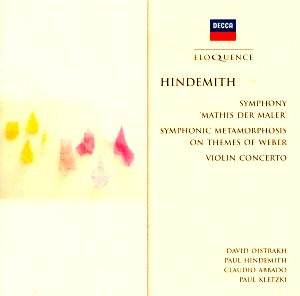Little was said of Hindemith during the last decade’s
focus on the revival of Nazi-condemned music (1920-45). Other names
drew down much more attention. The music of Krasa, Goldschmidt, deserved
revival and reassessment but perhaps because Hindemith was already much
more than a name on the international concert stage his music fell into
the background; not that there was any shortage of recordings.
It is much too easily forgotten that Hindemith was
something of a 'bad boy' in his salad days. Operatic and dance shockers
like Nusch-Nuschi gave the early signs of a voice unlikely to
be curved by political conformity. Things came to a head with the first
performance of the symphony Mathis der Maler. There were protests
and the regime which had been looking for a pretext for a cultural putsch
stripped the composer of all academic appointments and banned the playing
of his music. In 1938, none too soon, he went to the USA and to
academic preferment at Yale University. He never returned to Germany
despite entreaties.
The Symphony is based on Hindemith's eponymous opera.
The subject is the sixteenth century German painter Mathias Grunewald.
Grunewald forsook establishment comfort. He took up with the peasantry's
rebellion in 1525 against oppression by the nobility only to find the
supplanters as bad as the supplanted. The opera was recorded by EMI
in the black vinyl age with Kubelik conducting a Bavarian production
and Dietrich Fischer-Dieskau in the title role. Famously DF-D recorded
for DG another of Hindemith's operas - Cardillac.
The Symphony is in three movements. This is a spiritual
work with a subtext of turmoil and conflict. The conflict is most significantly
within - the struggle of conscience and conviction of an intelligent
artists and this had layers of significance for the dispossessed composer.
Kletzki gives an emotionally engaged performance and there is some shatteringly
and batteringly gripping brass playing in the final movement Versuchung
des heiligen Antonius. Overall though this performance leaves the
suspicion that there is more to the work than this although each time
I hear the Antonius movement and especially the OSR violins 9.02
I have fewer doubts, at least about that movement. One of these days
I hope to be able to compare this with Karajan's 1960 version. I wonder
what Hindemith made of HvK's recording. He could easily have heard it.
Intriguingly the transparencies of the Metamorphosis have been
sacrificed for the dense layering of sound.
In 1962 the composer went into the Decca studios in
London to record his Violin Concerto. Presumably he took the opportunity
while there to drop in to see his friend William Walton whose Viola
Concerto he had premiered in the 1920s. The Violin Concerto can be viewed
as a nostalgic hymn to a German romanticism that the composer saw as
utterly divorced from Nazi helden art. Oistrakh's magisterial
performance makes this a disc apart. The singing line is accentuated
by Oistrakh and the presence of the composer just one year before his
death lends authority to the reading. The elements of the concerto include
pawky humour à la Shostakovich, Waltonian capering and romance
(it is just a shade Bergian); the latter elements clearest at
7.40 in the Langsam. There are uproarious climaxes, serene sincerity
and the sort of subtle unpredictable cantilena you find in Prokofiev's
First Violin Concerto moderated by a neo-classical grain or two.
The caring and sensitively balanced Weber Metamorphosis
from Abbado and the LSO is the centrepiece here. Even if you have
problems with the mock oriental tinge of the Turandot second
movement you should find rewarding musical sustenance in the tender
andantino. Hindemith can be rather heartless but in this movement
he defies critics. An honest down-to-earth balance gives the listener
the feeling of hearing everything. The Metamorphosis is in four
movements and spins the music from three piano pieces and the main theme
from Weber's Turandot overture. If you don't know the piece but
you do like Bartók's Concerto for Orchestra you will like
this.
Good, English-only, notes by David Hurwitz.
Rob Barnett


